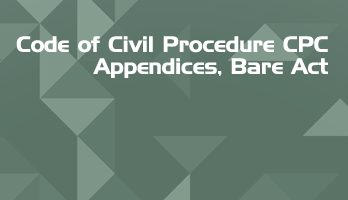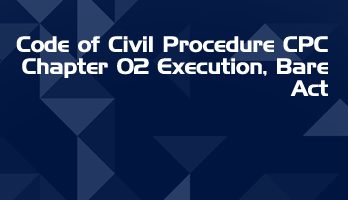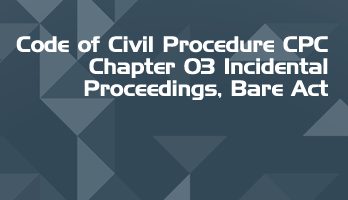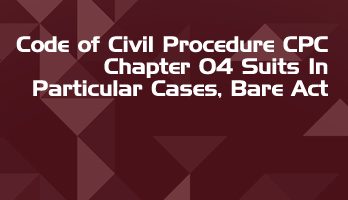A 'Bare act' is the actual legislation passed by the Parliament of India. Generally, an act sets out the high level legal and policy principles applicable to the subject matter of the law.
Most acts are accompanied by 'subsidiary legislation' such as rules, regulations, notifications and orders; which address the actual implementation detail of the act.
Free Full Course Available on LawMint's YouTube Channel
How to Land Your Dream LLB Internship in a Top Law Firm
- Part 1 - Introduction
- Part 2 - Internship Planning
- Part 3 - Internship Research
- Part 4 - Building Your Profile
- Part 5 - The Email
- Part 6 - The Resume
- Part 7 - The Cover Letter
- Part 8 - The Interview
- Part 9 - Self Development
Practical and comprehensive course, with real examples and step-by-step analysis of the complete internship application process. Check out LawMint's YouTube channel now!
Civil Procedure Code, 1908
Part VII – Appeals
Section 96 – Appeal from original decree
- Save where otherwise expressly provided in the body of this Code or by any other law for the time being in force, an appeal shall lie from every decree passed by any Court exercising original jurisdiction the Court authorized to hear appeals from the decisions of such Court.
- An appeal may lie from an original decree passed ex parte.
- No appeal shall lie from a decree passed by the Court with the consent of parties.
- No appeal shall lie, except on a question of law, from a decree in any suit of the nature cognisable by Courts of Small Cause, when the amount or value of the subject – matter of the original suit does not exceed three thousand rupees.
Section 97 – Appeal from final decree where no appeal from preliminary decree
Where any party aggrieved by a preliminary decree passed after the commencement of this Code does not appeal from such decree, he shall be precluded from disputing its correctness in any appeal with may be preferred from the final decree.
Section 98 – Decision where appeal heard by two or more Judges
- Where an appeal is heard by a Bench of two or more Judges, the appeal shall be decided in accordance with the opinion of such Judges or of the majority (if any) of such Judges.
- Where there is no such majority which concurs in a judgment varying or reversing the decree appealed from, such decree shall be confirmed; Provided that where the Bench hearing the appeal is composed of two or other even number of Judges belonging to a Court consisting of more Judges than those constituting the Bench and the Judges composing the Bench differ in opinion on a point of law, they may state the point of law upon which they differ and the appeal shall then be heard upon that point only by one or more of the other Judges, and such point shall be decided according to the opinion of the majority (if any) of the Judges who have heard the appeal including those who first heard it.
- Nothing in this section shall be deemed to alter or otherwise affect any provision of the letters patent of any High Court.
Section 99 – No decree to be reversed or modified for error or irregularity not affecting merits or jurisdiction
No decree shall be reversed or substantially varied, nor shall any case be remanded in appeal on account of any misjoinder or non – joinder of parties or causes of action or any error, defect or irregularity in any proceedings in the suit, not affecting the merits of the case or the jurisdiction of the Court;
Provided that nothing in this section shall apply to non – joinder of a necessary party.
Section 99A – No order under section 47 to be refused or modified unless decision of the case is prejudicially affected
Without prejudice to the generality of the provisions of section 99, no order under section 47 shall be reversed or substantially varied, on account of any error, defect or irregularity in any proceeding relating to such order, unless such error, defect or irregularity has prejudicially affected the decision of the case.
Section 100 – Second appeal
- Save as otherwise expressly provided in the body of this Code or by any other law for the time being in force, an appeal shall lie to the High Court from every decree passed in appeal by any Court subordinate to the High Court, if the High Court is satisfied that the case involves a substantial question of law.
- An appeal may lie under this section from an appellate decree passed ex parte.
- In an appeal under this section, the memorandum of appeal shall precisely state the substantial question of law involved in the appeal.
- Where the High Court is satisfied that a substantial question of law is involved in any case, it shall formulate that question.
- The appeal shall be heard on the question so formulated and the respondent shall, at the hearing of the appeal, be allowed to argue that the case does not involve such question; Provided that nothing in this sub – section shall be deemed to take away or abridge the power of the Court to hear, for reasons to be recorded, the appeal on any other substantial question of law, not formulated by it, if it is satisfied that the case involves such question.
Section 100A – No further appeal in certain cases
Notwithstanding anything contained in any Letters Patent for any High Court or in any other instrument having the force of law or in any other law for the time being in force, where any appeal from an appellate decree or order is heard and decided by a single Judge of a High Court, no further appeal shall lie from the judgment, decision or order or such single Judge in such appeal or from any decree passed in such appeal.
Section 101 – Second appeal on no other grounds
No second appeal shall lie except on the ground mentioned in section 100.
Section 102 – No second appeal in certain suits
No second appeal shall lie in any suit of the nature cognizable by Courts of Small Causes, when the amount or value of the subject – matter of the original suit does not exceed three thousand rupees.
Section 103 – Power of High Court to determine issues of fact
In any second appeal, the High Court may, if the evidence on the record is sufficient, determine any issue necessary for the disposal of the appeal –
- which has not been determined by the lower Appellate Court or both by the Court of first instance and the lower Appellate Court, or
- which has been wrongly determined by such Court or Courts reason of a decision on such question of law as is referred to in section 100.
Section 104 – Orders from which appeal lies
- An appeal shall lie from the following orders, and save as otherwise expressly provided in the body of this Code or by any law for the time being in force, from no other orders –
- –
- –
- –
- –
- –
- – ff. an order under section 35A; ffa. an order under section 91 or section 92 refusing leave to institute a suit of the nature referred to in section 91 or section 92, as the case may be;
- an order under section 95;
- an order under any of the provisions of this Code imposing a fine or directing the arrest or detention in the civil prison of an person except where such arrest or detention is in execution of a decree;
- any order made under rules from which an appeal is expressly allowed by rules; Provided that not appeal shall lie against any order specified in clause (ff) save on the ground that no order, or an order for the payment of a less amount, ought to have been made.
- No appeal shall lie from any order passed in appeal under this section.
Section 105 – Other orders
- Save as otherwise expressly provided, no appeal shall lie from any order made by a Court in the exercise of its original or appellate jurisdiction; but, where a decree is appealed from, any error, defect or irregularity in any order, affecting the decision of the case, may be set forth as ground of objection in the memorandum of appeal.
- Notwithstanding anything contained in sub – section (1), where any party aggrieved by an order of remand from which an appeal lies does not appeal therefrom, he shall thereafter be precluded from disputing its correctness.
Section 106 – What Courts to hear appeals
Where an appeal from any order is allowed it shall lie to the Court to which an appeal would lie from the decree in the suit in which such order was made, or where such order is made by a Court (not being a High Court) in the exercise of appellate jurisdiction, then to the High Court.
Section 107 – Powers of Appellate Court
- Subject to such conditions and limitations as may be prescribed, an Appellate Court shall have power –
- to determine a case finally;
- to remand a case;
- to frame issues and refer them for trial;
- to take additional evidence or to require such evidence to be taken.
- Subject as aforesaid, the Appellate Court shall have the same powers and shall perform as nearly as may be the same duties as are conferred and imposed by this Code on Courts of original jurisdiction in respect of suits instituted therein.
Section 108 – Procedure in appeals from appellate decrees and orders
The provisions of this Part relating to appeals from original decree shall, so far as may be, apply to appeals –
- from appellate decrees, and
- from orders made under this Code or under any special or local law in which a different procedure is not provided.
Section 109 – When appeals lie to the Supreme Court
Subject to the provisions in Chapter IV of Part V of the Constitution and such rules as may, from time to time, be made by the Supreme Court regarding appeals from the Courts of India, and to the provisions hereinafter contained, an appeal shall lie to the Supreme Court from any judgment, decree or final order in a civil proceeding of a High Court, if the High Court certifies –
- that the case involves a substantial question of law of general importance; and
- that in the opinion of the High Court the said question needs to be decided by the Supreme Court.
Section 110 – Value of subject matters
Rep. by the Code of Civil Procedure (Amendment) Act, 1973 (49 of 1973).
Section 111 – Bar of certain appeals
Rep. by the A.O. 1950.
Section 111A – Appeals to Federal Court
Rep. by the Federal Court Act, 1941 (21 of 1941).
Section 112 – Savings
- Nothing contained in this Code shall be deemed –
- to affect the powers of the Supreme Court under article 136 or any other provision of the Constitution, or
- to interfere with any rules made by the Supreme Court, and for the time being in force, for the presentation of appeals to that Court, or their conduct before that Court.
- Nothing herein contained applies to any matter of criminal or admiralty or vice – admiralty jurisdiction or to appeals from orders and decrees of Prize Courts.
Important Central Acts in Regional Languages
Legislative department website also features regional language versions of several important Central Acts.
Free Full Course Available on LawMint's YouTube Channel
How to Land Your Dream LLB Internship in a Top Law Firm
- Part 1 - Introduction
- Part 2 - Internship Planning
- Part 3 - Internship Research
- Part 4 - Building Your Profile
- Part 5 - The Email
- Part 6 - The Resume
- Part 7 - The Cover Letter
- Part 8 - The Interview
- Part 9 - Self Development
Practical and comprehensive course, with real examples and step-by-step analysis of the complete internship application process. Check out LawMint's YouTube channel now!












